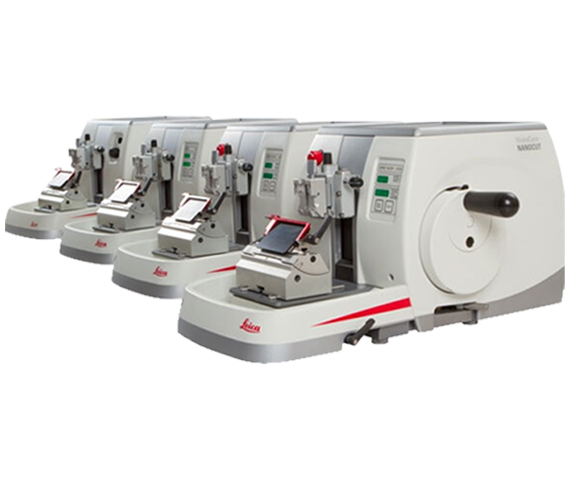

I authorize Leica Biosystems to contact me for the purposes selected. I understand that I may be contacted by a phone call, text message and/or email. By clicking the Submit button and proceeding I confirm that I have reviewed and agree with the Terms of Use and the Leica Biosystems Privacy Policy. I also understand my privacy choices as they pertain to my personal data as provided in the Leica Biosystems Privacy Policy.

Leica Biosystems is pleased to announce the expansion of our Kreatech FISH Probes for BOND menu. Combining the benefits of Kreatech REPEAT-FREE probe technology with the workflow efficiency and reliability provided by BOND fully automated IHC/ISH stainers, the expanded menu of FISH Probes for BOND represents an advancement in automatic FISH testing.
In this new webinar presented by Susan Corlett, CG (ASCP)CM (Application Specialist Cytogenomics), you will get a detailed overview of the benefits of FISH testing and in particular, how automated FISH testing can increase consistency, reproducibility whilst reducing manual labour time.


Set within a one-hundred-acre estate bordering the River Cam, Hinxton Hall Conference Centre is the ideal venue for you to work, recharge, and connect.
Located alongside research institutions that are leading the genomics revolution, Hinxton Hall Conference Centre is the perfect location for the upcoming Translational Research Summit by Leica Biosystems. Join us on 21 September and network with your peers, meet with our partner experts, and experience live demonstrations of research solutions by Leica Biosystems.
When: Wednesday, 21 September
Time: 9am – 5pm (BST)
Where: Hinxton Hall Conference Centre, Wellcome Genome Campus, Hinxton CB10 1RQ
AGENDA
| TIME | EVENT | SPEAKER |
| 09.00am – 09.30am | Registration & Coffee | |
| 09.30am – 09.45am | Welcome & Intro to partners | Gareth Petty Sales Enablement Manager Advanced Staining and Life Science, Leica Biosystems |
| 09.45am – 10.30am | Keynote Speaker: Translational Research: Why IHC and Digital Pathology matter |
Will Howat Senior Director of Validation & Technical Quality, Abcam |
| 10.30am – 11.00am | How to Develop a 6-plex Chromogenic MX Stain on an Automated Staining System Multiplexing can be applied to address several types of research questions including, but not limited to, the spatial arrangement or quantity of different cell lineages, phenotyping of immune cells, evaluation of multiple effectors of signal transduction pathways, and the distribution of novel drugs. |
Charlotte Gray Application Consultant, Leica Biosystems |
| 11.00am – 11.30am | Automated TRCBC1 and TRBC2 BaseScopeTM as a novel, quicker and cheaper method for the diagnosis of T-cell lymphoma We undertook a pilot study in T-cell lymphomas and corresponding benign samples on the BOND RX research stainer, using BaseScopeTM probes located in the highly divergent 3’UTRs of TRBC1 and TRBC2. We showed that accurate diagnosis of T-cell lymphomas could be achieved in the majority of cases with this method. We obtained similar results for the companion animals, dog and cat, in which the clinical question of T-cell lymphoma arises more frequently than in humans. Data will be presented indicating the potential utility of this approach in clinical practice. |
Dr. Elizabeth Soilleux Associate Professor, Honorary Consultant Pathologist and Research Group Leader, Dept of Pathology, University of Cambridge |
| 11.30am – 12.00pm | BOND RX research stainer: Fully automated RNAscope assays RNA in situ hybridization (ISH) is a powerful tool that can be used for prognostic, diagnostic and research purposes, and can be used to expand our understanding of normal biology, as well as disease. This presentation will show how these formerly lengthy and tedious assays have now been fully automated for use on the BOND RX staining system, and as an IVD assay for the BOND-III Fully Automated IHC and ISH Staining System. |
Paul Turner, PhD Field Application Scientist, Advanced Cell Diagnostics |
| 12.00pm – 1.30pm | Lunch, posters & demos | |
| 1.30pm – 2pm | Fluorescent multiplex staining of RNA and protein targets on the BOND RX research stainer The Experimental Histopathology facility at the Francis Crick Institute has been using the BOND RX system since 2020 to optimize bespoke RNAscope assays, and multiplex immunofluorescence panels using OPAL fluorophores and multimodal RNA/protein staining in addition to running routine immunohistochemistry. Utilizing the high level of adaptability within the BOND RX research stainer, we have modified protocols to apply technologies to a wide range of research fields using both human and mouse tissues. |
Dr Mary Green Principal Laboratory Research Scientist, Experimental Histopathology, The Francis Crick Institute |
| 2pm – 2.30pm | Digital Ready Slides The adoption of digital pathology is a multifaceted project involving many stakeholders across the pathology department. The impact on the laboratory is not isolated to simply installing a scanner but rather affects the whole workflow to generate optimized Digital Ready Slides. Standardization of histological slide preparation requires focusing on optimizing individual workflow steps and a holistic overview of the complete process from sample acquisition right through to diagnosis. |
Olga Colgan, PhD Global Brand Strategy Director, Leica Biosystems |
| 2.30pm – 3pm | Fully Automated Workflows for High Plex Multiomic Profiling with GeoMx® Digital Spatial Profiler and BOND RX/RXm fully automated research stainer from Leica Biosystems NanoString’s GeoMx® DSP allows for the characterization of spatial distribution and abundance of proteins and RNA with morphological context. This extends the ability for enhanced translational research in many areas including immunology, oncology, and neuropathology with downstream analysis of analyte abundance by nCounter or Next Generation Sequencing. |
Bryan Serrels Technical Sales Specialist for Spatial Biology, NanoString |
| 3pm – 3.30pm | Coffee Break & Demos | |
| 3.30pm – 4pm | Characterizing the tumour microenvironment through immunophenotyping and spatial biology using Ultivue 8-plex immunofluorescence technology on the BOND RX research stainer Multiplex immunofluorescence (mIF) assays offer the advantage of preserving the architectural features of the tumor microenvironment and revealing the spatial relationships between tumor cells and immune cells that are present. Using custom-designed Ultivue 8-plex kits on the BOND RX system by Leica Biosystems, it enables the definition of the T cell phenotypes spatially and quantitively. This is especially important in treatment response monitoring and TME infiltration assessment in immunotherapy clinical programmes at Adaptimmune where next generation SPEAR-T cell have been developed using Adaptimmune’s affinity-enhanced tumour antigen targeting TCR technology. |
Robyn Broad, PhD Senior Scientist, Tumor Profiling, Translational Sciences, AdaptImmune |
| 4pm – 5pm | Panel Discussion & Close | Gareth Petty Sales Enablement Manager Advanced Staining and Life Science, Leica Biosystems Fiona Smith Marketing Manager, Leica Biosystems |
|
Will Howat
|
Charlotte Gray |
Dr Elizabeth Soilleux |
|
Paul Turner |
Dr Mary Green |
Olga Colgan |
|
Bryan Serrels |
Robyn Broad |
I authorize Leica Biosystems to contact me for the purposes selected. I understand that I may be contacted by a phone call, text message and/or email. By clicking the Submit button and proceeding I confirm that I have reviewed and agree with the Terms of Use and the Leica Biosystems Privacy Policy. I also understand my privacy choices as they pertain to my personal data as provided in the Leica Biosystems Privacy Policy.